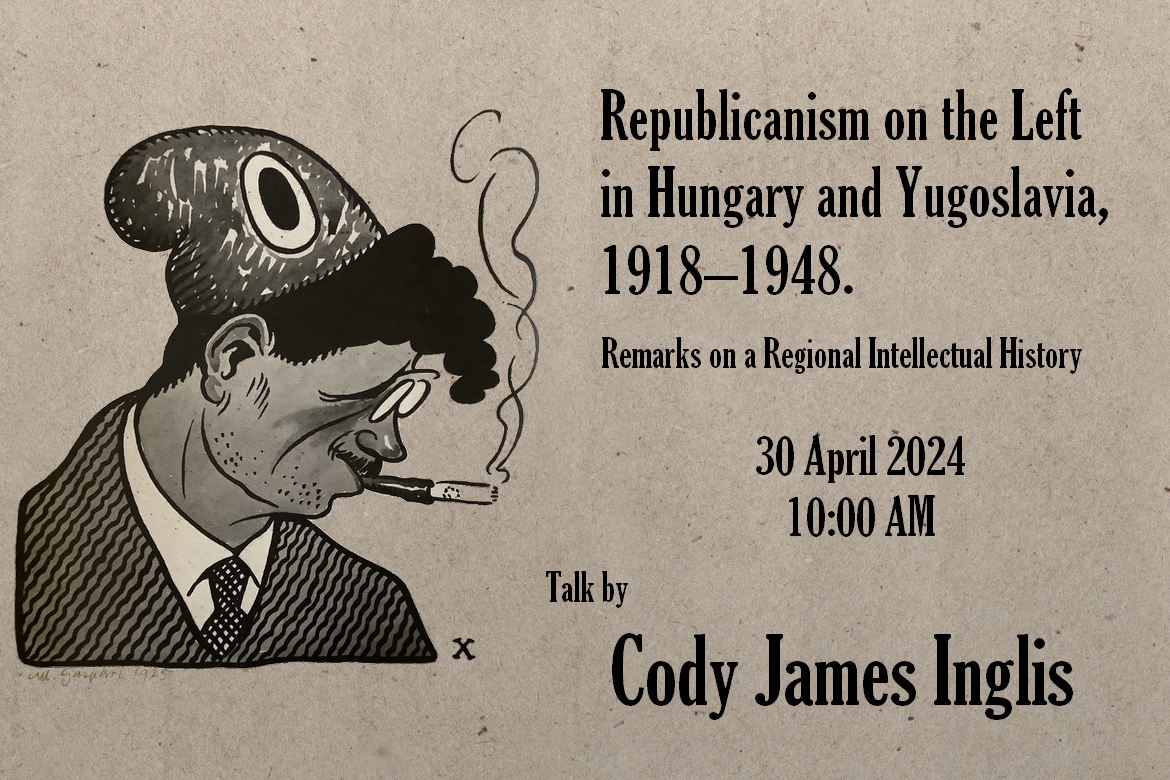A HUN-REN BTK Filozófiai Intézet Filozófiatörténet és Eszmetörténet Osztálya szeretettel meghív minden érdeklődőt Cody James Inglis (doctoral candidate in comparative history at the Department of History, Central European University, Vienna) Republicanism on the Left in Hungary and Yugoslavia, 1918–1948. Remarks on a Regional Intellectual History című előadására.
Borítókép: Maksim Gaspari, Caricature of Albin Prepeluh as a Jacobin, 1925, in Arhiv Republike Slovenije (Ljubljana), SI AS 2077 Zbirka Albina Prepeluha, t.e. 4.
Az előadás és az utána következő diskurzus angol nyelven zajlik.
Időpont: 2024. április 30. kedd, 10:00
Helyszín: BTK Filozófiai Intézet, 1097 Budapest, Tóth Kálmán u. 4., 7. emelet, Trapéz terem (B.7.16)
Az előadáshoz online is lehet csatlakozni az alábbi linken:
https://us06web.zoom.us/j/3612246778?pwd=dXRHZ0I3YWw5bjA0elpSS3pYQzgrZz09&omn=85489980478
Az esemény Facebookon is elérhető ezen a linken.
Abstract:
In late 1919, already in exile, Oszkár Jászi (1875–1957) was interviewed by the Neue Zürcher Zeitung. The people of Hungary, Jászi argued, seemed to yearn for Habsburg restoration if only to recapture the sense of unity that the Empire had. But, he continued, “if it is not possible to create a free confederation of these young [successor] states on a democratic-republican basis, a militaristic-imperialist synthesis will result.” For Jászi and many Hungarian republican thinkers, a radical deepening of democracy and the creation of a (con)federation of republican states seemed to be the only way to overcome the international problems Central and Southeastern Europe faced in the postimperial period.
A few years later, in 1924, Albin Prepeluh (1880–1937) and Dragotin Lončar (1876–1954) donned the pseudonym ‘Slovenski republikanci (Slovene Republicans)’ to publish a small pamphlet entitled Why Are We Republicans? (Zakaj smo republikanci?). In the text, Prepeluh and Lončar identified the “rule of the people” (vlada ljudstva) as the core of republicanism, nothing more than the ancient Greek formula of ‘démos’ + ‘kratéo’ fully realized. Yugoslavia needed a radical departure from feudalism, social hierarchy, and monarchy. “The state,” Prepeluh and Lončar wrote, “ought not be over the people, rather the executor of the popular will (ljudska volja).” The one-time monarchist Svetozar Pribićević (1875–1936) also argued for precisely this in his La dictature du roi Alexandre from 1933. The Yugoslav state had hurtled toward dictatorship because it had neither been democratic, nor republican, nor federal.
In both Hungary and Yugoslavia, ideas of republican statehood—and the promise of human freedom and democratic flourishing it would bring—abounded on the Left. This lecture will give an overview of these debates and interpret them in their contexts. The comparison of Hungary and Yugoslavia will be particularly fruitful, since both contexts retained monarchic forms of state, dynastic public symbolism, and constrained parliamentarism. Republicanism in these contexts was not a neutral, abstract political philosophical reflection; rather, a radical contestation of the authoritarian foundations of the postimperial Hungarian and Yugoslav states.



